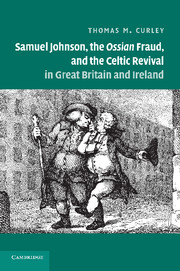Book contents
- Frontmatter
- Contents
- Prefatory acknowledgments
- 1 An introductory survey of scholarship on Ossian: why literary truth matters
- 2 James Macpherson's violation of literary truth
- 3 Johnson on truth, frauds, and folklore: in the company of Thomas Percy
- 4 Searching for truth in the Highlands: Macpherson throws down the gauntlet
- 5 Charles O'Conor and the Celtic Revival in Ireland
- 6 Johnson and the Irish: more opposition to Ossian
- 7 Johnson's last word on Ossian with William Shaw: a finale to controversy
- Appendix A A Reply to Mr. Clark's Answer
- Notes
- Bibliography
- Index
2 - James Macpherson's violation of literary truth
Published online by Cambridge University Press: 30 July 2009
- Frontmatter
- Contents
- Prefatory acknowledgments
- 1 An introductory survey of scholarship on Ossian: why literary truth matters
- 2 James Macpherson's violation of literary truth
- 3 Johnson on truth, frauds, and folklore: in the company of Thomas Percy
- 4 Searching for truth in the Highlands: Macpherson throws down the gauntlet
- 5 Charles O'Conor and the Celtic Revival in Ireland
- 6 Johnson and the Irish: more opposition to Ossian
- 7 Johnson's last word on Ossian with William Shaw: a finale to controversy
- Appendix A A Reply to Mr. Clark's Answer
- Notes
- Bibliography
- Index
Summary
Forgery is one of the most dangerous and extensive evils to which men are subjected by the combinations of society and the regulations of civil life.
Sir Robert Chambers, A Course of Lectures on the English Law (1766–70)A biographical sketch is in order: the perpetrator of literary deception was an ambitious young author, large of frame and irritable in disposition, who was university educated but lacking a degree. Wanting to escape the obscurity of schoolteaching, he made his bid for literary fame in the metropolis by publishing some anonymous poetry. Notoriety, however, was difficult to come by, until he turned to the first major project of his writing career. This was a work of almost complete fabrication, composed rather quickly over several years and based on very meager original materials or, mostly, none at all. From slight cues he invented a whole cast of characters and imposed a monotone declamatory style of high drama on his literary creation for a pervasive nobility of sentiment. Initially he probably felt no serious qualms of conscience about a seemingly harmless manipulation of minimal sources, as the duped public responded well to his efforts. His virtual authorship, despite hints and suspicions, remained widely unknown until after his death, and burial in Westminster Abbey crowned his worldly successes. This is the true story of James Macpherson, creator of Ossian (1760–3), and this is the true story of Samuel Johnson, creator of the Parliamentary Debates (ca. 1740–3).
- Type
- Chapter
- Information
- Publisher: Cambridge University PressPrint publication year: 2009



